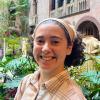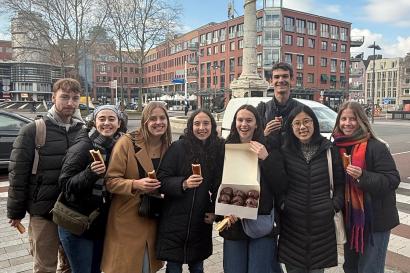I’m not too sure what I expected LGBTQ life to be like in the first country that has legalized same sex marriage. Maybe that rainbow confetti would get thrown at me upon my first step into the Netherlands, or that a crowd of happy queers decked out in rainbow attire would be present everyway I looked. I was ultimately just searching for a place to call home within the heteronormative (the assumption that straight is the “normal” version of being) world I so often felt I had to hide in.
It didn’t turn out exactly like that. But my first day in Amsterdam, I walked by a crowd of people proudly wearing LGBTQ and trans flags, and immediately I felt it. Solidarity. Representation. Because queer life has been legal in the Amsterdam for about 17 years, there isn’t the same pressure to identify as LGBTQ and fight for rights, as there so often is in the United States. Queer folk tend to live the same normalized quality of life as straight folk. Yet it’s hard to give up that internal pull I feel to fight for queer rights. To attend any pride event I find in the constant struggle to normalize queerness. I had to learn that this wasn’t my time to fight, it was a time to breathe, and to bask in the glory of acceptance.
My semester in Amsterdam has been the first time I’ve really experienced being part of an LGBTQ community. I oftentimes feel smothered by the pressure to appear straight. My high school had approximately one student who outwardly identified as queer. I entered college with the mindset that everyone was typically straight. There was a little more fluidity allowed in one’s identity in this realm of life, but there were about 30 outwardly queer people that I knew. I first realized my queer identity my sophomore year of college as I began to explore who I was as a person. I attended the NYC pride parade and for the first time felt truly connected to a movement. Yet I knew my first semester abroad in Quito, Ecuador was bound to bring challenges, so I kept hiding just a bit longer. I didn’t feel safe to be me.
In Quito, I was met with subtle microaggression of homophobia, and homosexuality was almost non-existent in the public sphere. Halfway through my semester, I became tired of being someone I wasn’t. Of venturing to all machismo orientated areas, keeping my distance and pretending I didn't mind being aggressively hit on by men. I decided the best way to fully feel like me was to look like me.
So, I chopped off all my hair. I had never felt freer.
Since then, I’ve adapted the mindset of being outwardly queer. I went into my semester in Amsterdam hoping for a community of fellow LGBTQ students, and I was not disappointed. I found my queer community within the first weeks in Amsterdam. Because of Amsterdam’s liberal status, I assumed the queer population in IES Abroad Amsterdam would be a little higher than in other programs. Fellow IES Abroad students and I found ways to slip queerness into conversation, to consolidate a community. We affectionalely created a group chat called "queeries". Then we expanded further, as I along with my friends joined the student LGBTQ community in Amsterdam, called A.S.V. Gay. Every Wednesday, we’re invited to a borrell (the Dutch version of a cocktail night) along with fellow queer members. And every Wednesday, I’m greeted with the seemingly never-ending stream of queer and trans flags hanging outside bar and club doorways, and a welcoming smile from fellow LGBTQ members that welcome us with open arms.
I know my time in Amsterdam is temporary. In a little more than a month I’ll be on my way home. But my experience of acceptance isn’t one that can be taken away. I will now be more active and will full-heartedly participate in LGBTQ events and organizations back home, because I know who I am. I’m a queer woman. I've hidden from homophobia and rejoiced in acceptance. I want to foster a community full of more LGBTQ acceptance, representation, and variety. I want to validate all forms of homosexuality. From the Western narrative of coming out and being proud, to the narratives of other cultures such as the Mati community in which sexuality is an act of doing, instead of an identity that needs to be defined (Gloria Wekker’s book “White Innocence” is an insightful look into her work with the Mati community, as well as the work she’s done to examine race and hidden racism in the Netherlands. I highly recommend).
There are still issues within the span of LGBTQ+ community and policies, as there are in most realms of society. I’ve spent time learned about the Islamophobic attitudes of the Netherlands that silence queer Muslims, and the pressure to confrom to the Western version of being gay and define it as the only correct version of being gay. I know I cannot possibly change entire systems that function on heteronormativity and oppression, but I now am equipt to do small things. To share my experiences, to truly listen to others, and to hopefully make positive change in the lives of my fellow LGBTQ members. Thanks to my year long experience with queerness in two differing culutres, I'm propsing to do a Fulbright fellowship after my graduation, to continue to research different ways of being LGBTQ across the globe, and what I can do to make real change.

Emily Radford
<p>I’m studying psychology and gender studies at the University of Rochester. I just came back from studying in Quito, Ecuador for a semester and this spring semester I will be studying in Amsterdam, Netherlands. I feel most at home when I’m backpacking and climbing mountains, I’m a lover of pancakes and language, and I’m skilled at sleeping on all forms of public transport.</p>







